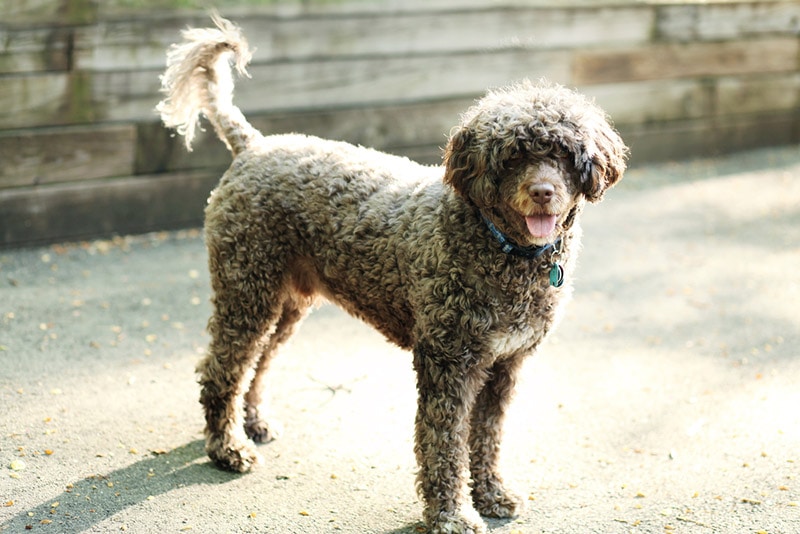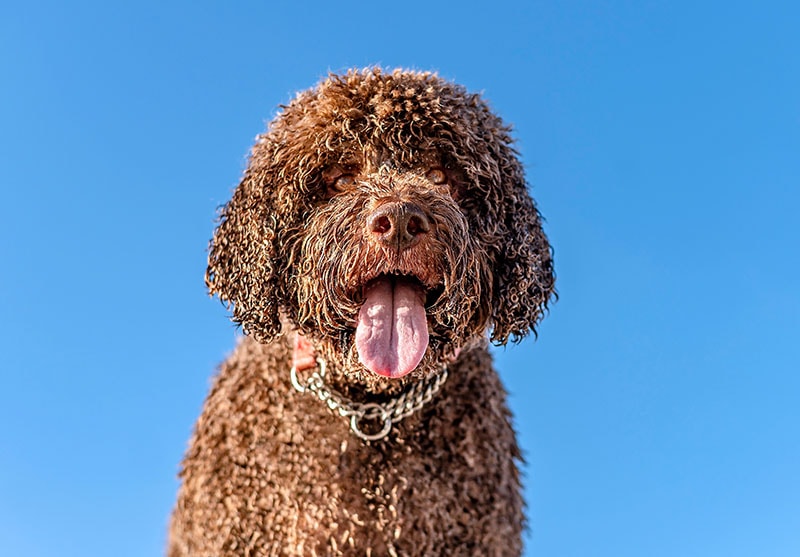How Long Do Portuguese Water Dogs Live? Vet Approved Lifespan, Data & Care
By Ed Malaker
Updated on

Click to Skip Ahead
The Portuguese Water Dog is an energetic and intelligent breed that has recently grown in popularity due to their friendliness and loyalty. These dogs are known for their athletic ability and love of the water, making them ideal for families who enjoy swimming and other water activities. However, like all dogs, Portuguese Water Dogs have a finite lifespan. The average lifespan of a Portuguese Water Dog is between 11 and 13 years. Keep reading as we explore how long a Portuguese Water Dog might live and the factors that can impact their longevity. This way, owners can take steps to ensure that their Portuguese Water Dog has a long, happy, and healthy life.
What’s the Average Lifespan of a Portuguese Water Dog?
The average lifespan of a Portuguese Water Dog is between 11 and 13 years, with most living to about 12.5 years. However, this can vary depending on several factors, such as genetics, diet, exercise, and overall health. Some Portuguese Water Dogs may live shorter or longer lives than the average, with some living as long as 18 years.

Why Do Some Portuguese Water Dogs Live Longer Than Others?
1. Nutrition
Proper complete and balanced nutrition plays a crucial role in a dog’s lifespan. For example, a balanced diet rich in nutrients, vitamins, and minerals can help support a dog’s overall health and well-being. We recommend choosing a brand with real meat, like chicken or turkey, listed as the first ingredient and avoiding brands that use chemical preservatives, like BHA or BHT, and artificial colors.
2. Environment and Conditions
A dog’s environment can also impact their lifespan. For example, dogs in clean, safe environments with minimal exposure to toxins, injuries, or hazards are less likely to develop health problems that can shorten their lifespan. Ensure that your dog has plenty of room to run to get the necessary exercise but isn’t stuck out in the sunlight, rain, or snow, and is in a secure and enclosed space.

3. Size
Obesity is a big problem for pets across the United States, with some experts suggesting that more than 50% need to lose weight. Obesity can predispose dogs to diabetes, heart and lung issues, joint issues, and many other health problems that can dramatically shorten your pet’s lifespan.
4. Genes
Genetics can affect your pet’s lifespan. For example, some dogs can have genetic health problems that might shorten their lifespan, while others might inherit genes that might protect them from certain health conditions.
5. Healthcare
Regular veterinary visits and prompt care for any health issues can go a long way toward extending your pet’s lifespan. For example, dogs that receive routine vaccinations, preventative medications, and dental care are less likely to develop health problems, and you are more likely to learn about major issues early.

The 5 Life Stages of a Portuguese Water Dog
Puppy
Your Portuguese Water Dog is a puppy until they are about 6 months old. During this time, they will require a special diet, and you should also try to socialize them with other animals and people as frequently as possible, so they are more social as adults. You will see their personalities develop during this time, and they will be curious, continually exploring their environment.
Adolescent
Around 6 months of age, Portuguese Water Dogs enter adolescence, and they will become more independent. They may also start to test boundaries, so having a training schedule in place is good. They may experience a growth spurt, affecting their diet and exercise needs.
Adult
Portuguese Water Dogs are adults when they reach about 2 years old and are no longer developing physically and mentally. They will also settle into their adult personalities.
Senior
Around 7 to 8 years of age, Portuguese Water Dogs enter their senior years and may start to experience age-related health issues, such as joint problems, dental issues, and reduced mobility. They may also require diet and exercise routine alterations to accommodate their changing needs.
Geriatric
Once your pet reaches 10–12 years old, they will enter the geriatric stage. Providing them with regular veterinary care, a comfortable living environment, and plenty of love and attention is essential.

How to Tell Your Portuguese Water Dog’s Age
Puppies have softer and fluffier fur than adults, which will have thick, rough coats. As the dog ages, the coat can begin to gray and thin in certain areas. But the best way to determine a dog’s age is to consult a veterinarian. They can examine your dog, paying particular attention to their teeth, eyes, coat, general appearance, and behavior, and give you a more accurate estimate based on their physical health and available medical history.
Conclusion
Portuguese Water Dogs usually live 11–13 years, with most living just over 12 years. However, several factors can affect your dog’s lifespan, including genetic history, diet, healthcare, and environment, so your pet might live longer or shorter than expected. Providing them with a nutritional diet is one of the best ways to prevent the onset of many health problems, and frequent veterinary checkups can alert you to any issues early.
- See Also: Portuguese Water Dog Pros & Cons
Featured Image Credit: Brook Robinson, Shutterstock















